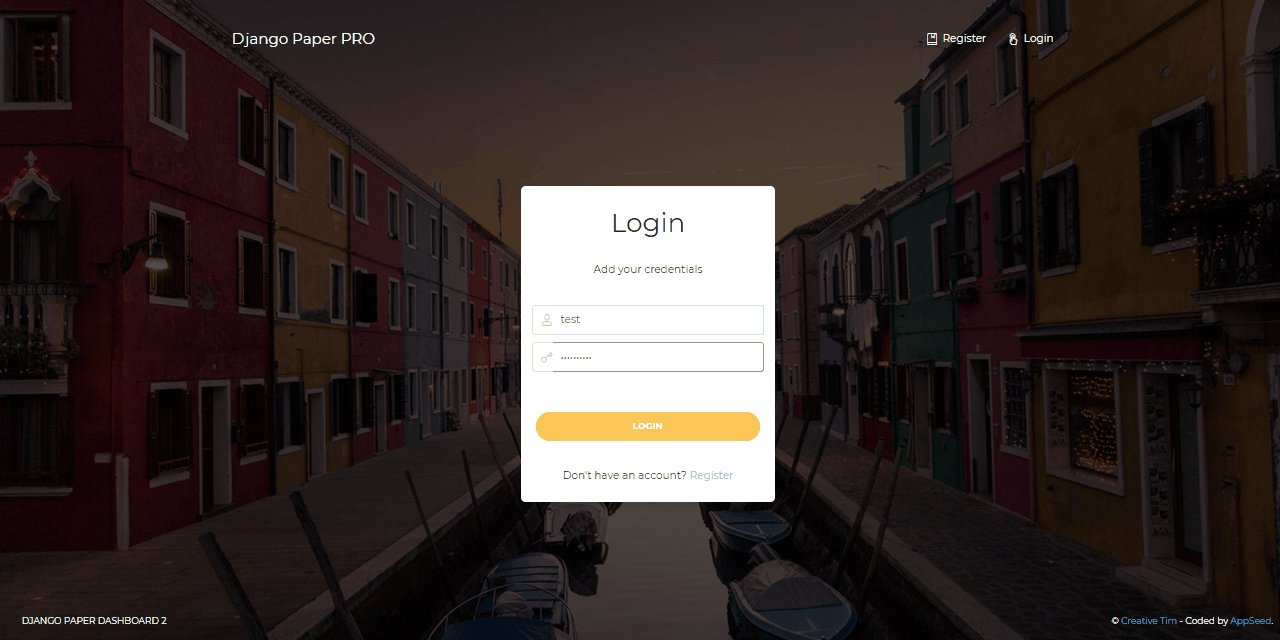Admin Dashboard generated by the AppSeed platform in Django Framework on top of Paper Dashboard PRO, a modern Bootstrap 4 dashboard template. The Django codebase comes with authentication, database, ORM, and deployment scripts.
Up-to-date dependencies: Django 3.2.6 LTS- SCSS compilation via Gulp
- UI-Ready app, SQLite Database, Django Native ORM
- Modular design, clean code-base
- Session-Based Authentication, Forms validation
- Deployment scripts: Docker, Gunicorn / Nginx
- Support via Github and Discord.
Links
- Django Paper PRO - product page
- Django Paper PRO - Demo - LIVE demo
Quick Start in Docker
Get the code
$ git clone https://github.com/app-generator/priv-django-paper-dashboard-pro.git
$ cd priv-django-paper-dashboard-proStart the app in Docker
$ docker-compose pull # download dependencies
$ docker-compose build # local set up
$ docker-compose up -d # start the app Visit http://localhost:85 in your browser. The app should be up & running.
$ # Get the code
$ git clone https://github.com/app-generator/priv-django-paper-dashboard-pro.git
$ cd priv-django-paper-dashboard-pro
$
$ # Virtualenv modules installation (Unix based systems)
$ virtualenv env
$ source env/bin/activate
$
$ # Virtualenv modules installation (Windows based systems)
$ # virtualenv env
$ # .\env\Scripts\activate
$
$ # Install modules - SQLite Storage
$ pip3 install -r requirements.txt
$
$ # Create tables
$ python manage.py makemigrations
$ python manage.py migrate
$
$ # Start the application (development mode)
$ python manage.py runserver # default port 8000
$
$ # Start the app - custom port
$ # python manage.py runserver 0.0.0.0:<your_port>
$
$ # Access the web app in browser: http://127.0.0.1:8000/Note: To use the app, please access the registration page and create a new user. After authentication, the app will unlock the private pages.
The project is coded using a simple and intuitive structure presented bellow:
< PROJECT ROOT >
|
|-- core/ # Implements app configuration
| |-- settings.py # Defines Global Settings
| |-- wsgi.py # Start the app in production
| |-- urls.py # Define URLs served by all apps/nodes
|
|-- apps/
| |
| |-- home/ # A simple app that serve HTML files
| | |-- views.py # Serve HTML pages for authenticated users
| | |-- urls.py # Define some super simple routes
| |
| |-- authentication/ # Handles auth routes (login and register)
| | |-- urls.py # Define authentication routes
| | |-- views.py # Handles login and registration
| | |-- forms.py # Define auth forms (login and register)
| |
| |-- static/
| | |-- <css, JS, images> # CSS files, Javascripts files
| |
| |-- templates/ # Templates used to render pages
| |-- includes/ # HTML chunks and components
| | |-- navigation.html # Top menu component
| | |-- sidebar.html # Sidebar component
| | |-- footer.html # App Footer
| | |-- scripts.html # Scripts common to all pages
| |
| |-- layouts/ # Master pages
| | |-- base-fullscreen.html # Used by Authentication pages
| | |-- base.html # Used by common pages
| |
| |-- accounts/ # Authentication pages
| | |-- login.html # Login page
| | |-- register.html # Register page
| |
| |-- home/ # UI Kit Pages
| |-- index.html # Index page
| |-- 404-page.html # 404 page
| |-- *.html # All other pages
|
|-- requirements.txt # Development modules - SQLite storage
|
|-- .env # Inject Configuration via Environment
|-- manage.py # Start the app - Django default start script
|
|-- ************************************************************************The bootstrap flow
- Django bootstrapper
manage.pyusescore/settings.pyas the main configuration file core/settings.pyloads the app magic from.envfile- Redirect the guest users to Login page
- Unlock the pages served by app node for authenticated users
To recompile SCSS files, follow this setup:
Step #1 - Install tools
Step #2 - Change the working directory to assets folder
$ cd apps/static/assetsStep #3 - Install modules (this will create a classic node_modules directory)
$ npm install
// OR
$ yarnStep #4 - Edit & Recompile SCSS files
$ gulp scssThe generated file is saved in static/assets/css directory.
The app is provided with a basic configuration to be executed in Docker, Gunicorn, and Waitress.
Gunicorn 'Green Unicorn' is a Python WSGI HTTP Server for UNIX.
Install using pip
$ pip install gunicornStart the app using gunicorn binary
$ gunicorn --bind=0.0.0.0:8001 core.wsgi:application
Serving on http://localhost:8001Visit http://localhost:8001 in your browser. The app should be up & running.
Waitress (Gunicorn equivalent for Windows) is meant to be a production-quality pure-Python WSGI server with very acceptable performance. It has no dependencies except ones that live in the Python standard library.
Install using pip
$ pip install waitressStart the app using waitress-serve
$ waitress-serve --port=8001 core.wsgi:application
Serving on http://localhost:8001Visit http://localhost:8001 in your browser. The app should be up & running.
- Django - The official website
- Boilerplate Code - Index provided by AppSeed
- Boilerplate Code - Index published on Github
Django Paper PRO - Provided by AppSeed App Generator.
